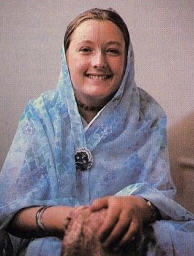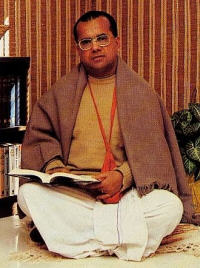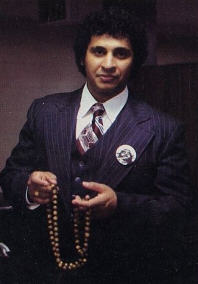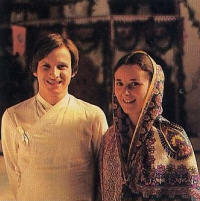A nurse, an executive, a health spa owner, an engineer, and an architect
tell how and why they joined the Hare Krsna movement.
Before joining the Vancouver Hare Krsna temple, Sraddha dasi was a nurse. "I used to work all the time with people who were dying," she says, "and at the time of death you can almost see the spirit soul leaving the body it's kind of like water pouring out of a cup. Especially when somebody dies very quickly. The hands and feet lose their consciousness, the extremities of the body get cold you could stick a pin in them and they wouldn't even feel it until gradually the only place that's really warm at all is around the heart. It's just like a wave. All the consciousness just goes out of the body.
"So I was wondering, 'Could we really be just these bodies alive one minute and dead the next?' And I was realizing, 'We can't be these bodies. We're whatever it is that makes the difference between a live body and a dead body.' But I couldn't find anything that agreed with that until I read Prabhupada's books.
"One time this lady was dying. She wasn't a very old lady, either. But somehow she just started hemorrhaging internally. I knew she was, because of her symptoms. So I phoned up the doctor it was Friday night and I said, 'Hello, Dr. So-and-so?'
"He said, 'Oh, hello. I'm not here.'
"I said, 'Pardon me?'
"He said, 'I'm not here. I'm away for a week.'
"I said, 'What do you mean you're not here? I'm talking to you right now, and this person really needs a doctor.' As nurses, we can't do anything we're not authorized to do. We can't send a person to a hospital or give oxygen or anything, unless the doctor says we can do it. We just have to watch until we get authorization.
"But he said, 'Well, you'll just have to find someone else.'
"So I phoned another doctor, and he said, 'OK, I'll be in right away.' But he never came in. And so I just kind of sat by the lady's bed. And she said to me, 'Nurse, nurse, I'm dying! What am I supposed to do?'
"I said, 'I don't know.' And I just realized: 'Well, what is she supposed to do?' And actually I realized, 'Hey, I'm going to die, too…. I'm going to die, too.'
"I sat there holding her hand, and after she died I wrapped up her body and put it away, and I thought, 'Wow…. What could I have said to her?' You can't say, 'Oh, don't worry, dear. You have a thousand dollars in the bank, and you have a nice family.' It doesn't make any difference. Nothing makes any difference at that time.
"And so after a while I realized that there's no point to anything in the material world at all. There's no point at all. Actually, I couldn't find any reason for living the way people do. Because their death is just inevitable. They're all just going to die anyway. And it makes everything kind of useless. All these things people are so caught up in but they could just die at any second."
Soon this understanding came even closer to home. "After I had been a devotee for a few months," Sraddha relates, "my sister she was fifteen, she was going to be an Olympic swimmer, and she was so beautiful she got hit by a car, and she became a vegetable.
"And so they decided to use her body. They hooked it up to machines, and they used it for a whole bunch of tests, and then they pulled the plug out. I was really upset. And I was thinking, 'How could she die? My sister. I grew up with her. That's amazing.' And then I started reading the second chapter of Bhagavad-gita, and I realized that death is coming at any minute. It's sitting right behind you all the time. So if you think like that, you don't waste any time."
Sraddha had first come in touch with Krsna consciousness while still in nursing training. "I used to work night shift and go to college in the daytime," she says. "Actually, I was always looking for something more. At that time I was reading some sutras by Patanjali. It's very impersonal, and I wasn't very satisfied with it. But I didn't have anything else to read, and I'd never heard of Hare Krsna.
"One time I had just got out of school, and I was at a shopping mall. A devotee approached me and said, 'I want you to have this book.'
"I said, 'Look, I don't want anything to do with you. I want you to just get out of here.'
"He said, 'You must have this book." and we went back and forth like that. So I said to him, 'I'm not going to give you any money for it, because I haven't got any money. I'm very poor.'

"So I didn't give him any money, but he made me take the book. It was The Nectar of Devotion. So I said, 'Oh, all right,' and I just tossed it in my bag. I remember thinking afterward, 'I wonder why I was so rude to him?'
"Anyway, I didn't even think about the book. But then a few nights later I was working. It was about one or two o'clock in the morning, and I didn't have anything to do everybody was sleeping, dying…. We were sitting around reading. I finished reading Patanjali and threw it down, so I didn't have anything to read. And then I remembered that book, The Nectar of Devotion, and I started reading it. And I remember as soon as I started reading it, it made so much sense. I remember I started chanting that very night. While I was getting people up, cleaning their beds, and so on, I started chanting Hare Krsna.
"I went home the next day, and met my boyfriend. (We're married now; his name's Bhakti-rasa.) I remember saying, 'Have you seen this book? Have you heard about Krsna?'
"He told me he had. He used to meet the devotees all the time in Toronto. 'I know the Hare Krsna people,' he said. 'They're really nice.. I don't like the way they force you to take things in the street, but they're really very nice people.' "
After that, Sraddha relates, she got married and moved to Calgary. Her husband would sometimes go to bookstores and get her books about Krsna consciousness, but they didn't see the Hare Krsna people again until four years later.
"Then we met some devotees, and we decided that we were going to join. I was at another hospital by that time. I'd finished my training. Also, I was enrolled in school again. I'd gotten a scholarship to go on and become a doctor. So I was taking some premed courses. But I wasn't satisfied with that, either.
"I was pretty well top of the class, but it all seemed so useless, And then I said, 'I'm quitting school.' And everyone said, 'Why?' And I said, 'Well, I'm going to go to Vancouver and join the Hare Krsna movement.'
"And they said, 'What? Are you crazy? What do you think you're doing?'
"But that's what we did."

Gopal Krishna Goswami
The spiritual coordinator for all the Hare Krsna temples in Canada is a devotee named Gopala Krsna dasa. Born in Delhi in 1946, he is the son of a commander in the Indian navy. Gopala Krsna earned a B.A. at Delhi University and a postgraduate business degree at the Sorbonne, where he studied for two years on a French government scholarship. Later he studied at the University of Toronto and received his master's degree in business management from McGill University, in Montreal.
"My upbringing was not at all religious," Gopala Krsna says. "Actually, before I came to Krsna consciousness I was very materialistic. But by November of 1967, a great urge had developed in me to discover spiritual life. One day on my way home I threw away my cigarette packet, and a few days later I gave up eating meat. The last movie I saw was some time that month, and I also stopped visiting the discotheques. This was all about six months before I met Srila Prabhupada.
"I started visiting different churches and temples in Toronto, hoping to find some guidance about God. And then, after I had moved to Montreal, I received a card inviting me to come to a special program at the Hare Krsna temple on May 30, 1968.
"So I attended that program, and afterward I was informed Srila Prabhupada would be arriving in town the next day. The devotees asked me if I wanted to come to the airport to greet him, but I said no, that wouldn't be possible.
"Just out of formality, I asked them if there was anything I could do to help, and they said, 'Yes! There's plenty to do.' They guided me to the apartment where Srila Prabhupada was going to be staying, and the first assignment they gave me was to clean the windows and shelves of his apartment.
"Frankly, I didn't relish this assignment, but I felt I was stuck. So on that very first day I worked nonstop from two or three in the afternoon till about nine in the evening. After finishing my cleaning duties, I returned to the temple, which was about five minutes away, and the devotees were so pleased with me that they offered me a glass of banana-flavored milk."
After Srila Prabhupada arrived in Montreal, Gopala Krsna began attending classes in the temple and meetings with Srila Prabhupada and the devotees at Srila Prabhupada's apartment in the evenings. "While listening to Srila Prabhupada, I would say to myself, 'This man is not very original. All he's doing is quoting and repeating what the previous teachers have said.' To me, intelligence meant being original. But after a while I realized that an authentic spiritual master doesn't invent something new, but instead repeats the spiritual knowledge given in the scriptures and transmitted to him by his own spiritual master. This is the secret of spiritual understanding.

"I was coming to the temple regularly," Gopala Krsna says, "and just after the first two or three weeks I knew that this was what I was looking for."
After joining the Krsna consciousness movement, Gopala Krsna continued to work at his job as a senior market research analyst for Pepsi-cola, and later he worked in a similar capacity for a major pharmaceutical company. His work, however, was not for himself but for Krsna. He contributed his earnings for spreading Krsna consciousness. This, Srila Prabhupada explained, was the process of yoga to work for Krsna's service, without being attached to enjoying the fruits of the work for oneself. While working at his regular job, he also organized the first publications about Krsna consciousness in French. (He speaks French, English, and Hindi fluently.)
After several years, Gopala Krsna left his job to dedicate his full time to the work of the Krsna consciousness movement. Now he divides his time between overseeing temples and book publication, in India and in Canada. "Canada has a very large Indian community," he remarks. "In fact, Toronto has more than 100,000 people of Indian origin the largest Indian community in North America. Of course, when Indian people come to the West, they're primarily interested in material benefits, but when they see young Westerners taking part in this Krsna consciousness movement, they have second thoughts and start to realize the tremendous spiritual value of their own heritage."
One Indian devotee residing in Toronto is thirty-four-year-old Visnu-tattva dasa, a former Mr. Ontario, with a wall full of trophies and a black belt in karate. Visnu-tattva owns a health club in the suburb of Barrie, about an hour from the city. "I'm forty-five miles away from the temple," he says, "but we're doing our devotional service, my wife and I. We offer all our food to Krsna and follow the four regulative principles [no gambling, no intoxication, no meat-eating, and no illicit sex) very strictly."
Both Visnu-tattva and his wife were born in Fiji and come from Gujarati Indian families. In 1970 they moved to Canada and became Canadian citizens. In 1971 Visnu-tattva began managing the three-story health club, with its gymnasium, swimming pool, sauna, whirlpool, sun room, and dozens of exercise machines. Later he bought out the owner and took over the business himself.
Each month Visnu-tattva sets aside roughly a thousand dollars to cover his family's expenses, plus something extra to keep expanding the business. Beyond that, he gives everything to help spread Krsna consciousness (fifty percent goes to the Hare Krsna temple in Toronto and fifty percent to the temple in Delhi).
Visnu-tattva says that indirectly his body building helped him become Krsna conscious. "In my younger days, exercising was what kept me away from all kinds of degrading activities. Because of these exercises, I kept away from drinking and even the women. I just didn't have time for illicit activities. I mean, I knew that all those things were wrong, and that if I did them I would lose my body's shape. And so psychologically this kept me strong."
It was his wife who first brought him to the temple in Toronto. "My wife was always a devotee," Visnu-tattva says. "Even as a young girl she used to get up at six each morning and water the tulasi plant [a plant sacred to Lord Krsna]. Starting from age eleven every morning at six o'clock.

"After she heard about the temple in Toronto, she said, 'Let's go to the temple.' And I said, 'I'm too busy today.' But she said, 'Let's go.' And she kept bugging me for six months in that way, until I said, 'OK, we'll go.' "
At the temple he met Visvakarma dasa, the temple president. "Visvakarma invited me to come in and have some prasada [food offered to Lord Krsna]. We left a donation and took some books, and I started reading the Bhagavatam."
Gradually, Visnu-tattva's Krsna consciousness began to revive. "Having been raised in Indian families," he says, "we knew about Krsna, but I had a Mayavadi [impersonal] conception, because I thought Brahma, Siva, and Visnu [Krsna] were one. But in his books Srila Prabhupada made it obvious that Krsna is the Supreme Personality of Godhead, the source of Brahma and Siva. So by reading the Bhagavatam we developed a solid, well-grounded trust in Prabhupada and in Lord Krsna. We understood that Krsna is the source of everything, that everything emanates from Him.
"Whenever I felt any anxiety about how my spiritual life was going," Visnu-tattva recalls, "I would call Visvakarma, and he'd clear things up for me. Then, too, with my wife already being a devotee of Krsna, we just carried on directly from there."
Tom Varadi is a process engineer at an oil refinery, and his wife Suzanne is an architect with a firm of consulting engineers. Tom and Suzanne began chanting Hare Krsna regularly a year ago. "We started with twenty minutes a day," Tom says, "and as more realizations kept coming to us, we kept chanting more each day.
"Before we got interested in Krsna consciousness, we had been involved in various types of yoga and meditation," says Tom. "We appreciated talking with devotees, but we always thought, you know, 'Here you have the mountain, and there are various ways to get to the top of the mountain.' We believed that each way was just as valid as any other way until we realized some of the things that were going on with some of these yoga and meditation groups."
Tom and Suzanne had been practicing a popular form of meditation. "We'd been meditating for quite a while seven years. First they had told me, 'You'll be a better businessman,' or a better … you know, whatever you wanted to be. But I was a bit more serious than that. I didn't want to be just a better businessman. Of course, at the beginning it was all laid out in a pleasant format. And we were quite young, so we went along.
"When we started," says Tom, "they told us things like, 'We promise you'll have enlightenment in five to eight years. We guarantee it.' But after five years we thought, 'Well, where is it"
"We started to see how shallow the whole thing was. About that time they started introducing new tricks to try to get more people. . . . ."
The siddhi business trying to sell us on levitation and mystic powers that's what finally did it," says Suzanne, "We both looked at each other and said, 'You know, four thousand dollars is what they're charging to learn this siddhi program.' Slowly. They charge you maybe a hundred dollars a shot … two or three hundred dollars. And you have to keep going from one course to the next to get to the siddhi.
Tom says, "I have an old acquaintance who started meditating at the same time I did. He even became a teacher, and he likes to show us pictures of people flying and all sorts of things. But we tell him, 'So what? Even if it were true, so what? What's the point?' "
Tom and Suzanne began investigating other methods of meditation, and gradually (it's a long story) they took to Krsna consciousness. Says Suzanne, "The more you chant, the more you realize about life … and about yourself."
Tom says, "I feel like I'm being put into the right position, sort of put in my place, so to speak. Your outlook really changes I guess according to your devotion in chanting and you begin to find your relationship with God."
"I know that the world is completely controlled," says Suzanne. "You can see it. That's another thing from chanting Hare Krsna. You see the perfection in Krsna's arrangement of everything. You see the whole thing laid out before you. Things fit together like a puzzle perfectly. By that process of chanting, the realizations follow, and you can just put the puzzle together. It's a slow process at first, and then it accelerates the more you chant."
